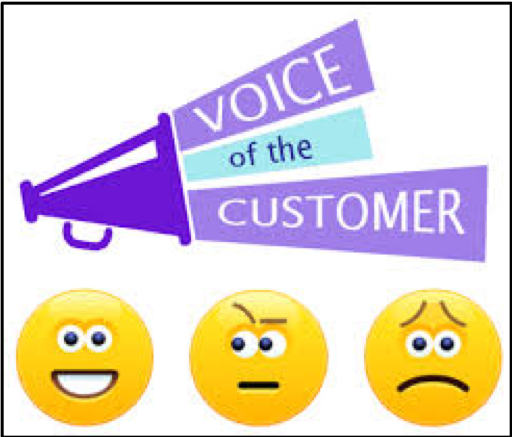Categories: Customer Service
By Frank Hurtte
River Heights Consulting
 The average company spends five percent (5%) of revenue on research & development ("R&D"), based on a report published by Strategy& (a global consulting organization). Innovative companies spend closer to twenty percent (20%). (Google spends 16.6%, Amazon 27.7% and pharma companies more than 20%.) While these tech organizations spend big on new and groundbreaking products, nearly every other company invests at least a portion of revenues on the future.
The average company spends five percent (5%) of revenue on research & development ("R&D"), based on a report published by Strategy& (a global consulting organization). Innovative companies spend closer to twenty percent (20%). (Google spends 16.6%, Amazon 27.7% and pharma companies more than 20%.) While these tech organizations spend big on new and groundbreaking products, nearly every other company invests at least a portion of revenues on the future.
Many believe that R&D involves white-smocked scientists working in some secret "skunk works" laboratory deep underground. Arguably, distributors sell products developed in this kind of technology-based research setting. But research and development involve more than just products. Some R&D develops intellectual property centered on trends, consumer behaviors, buying habits, and disruptive forces in the market. Sadly, all but a few distributors skip over this important point.
This drives two questions. First, are distributors somehow exempt from the need for research into the world around them? Second, and more importantly, is there value in focusing research on customers?
The truth is that, as a group, distributors have intense familiarity with their regular and reoccurring customer contacts. The problem is that, based on exploration with hundreds of distributors, these "regular and reoccurring" customers account for only 10-20 percent of the total possible connections. Furthermore, day-to-day interactions between your sellers and your customers may not reveal the whole picture. Let's explore an example...
A few years ago, I received an emergency call from a client. One of his top customers had given a 30-day notice that all future purchases would be channeled to a competitor. Based on the other guy's ability to facilitate a "commodity supply contract", the business was over, done, gone. Reportedly with teary-eyes the distributor's most important contact delivered the bad news and indicated the decision came from well above him and was irreversible.
Later research showed that the customer had been contemplating the move for nearly a year. Further, because the move interacted with the jobs of purchasing department and maintenance storeroom employees, management had withheld information from this group of customer contacts. Weekly sales calls with technicians, engineering and others had not uncovered any clues to the move. Yet, our after-the-fact exploration revealed that everyone in management knew about the supply contract change initiative, it being a tool to drive down transaction costs.
With distributors heralding customer intimacy, how was such a move missed? Pushing further, wouldn't this have been something worthy of research or at least inquiry? But this isn't the only topic distributors should be thinking about.
Why not gather, review and benchmark the views of your customers? After conducting dozens of customer-focused surveys, I have yet to see one that did not provide insight into customer direction, including overall customer sentiments in general, and breakdowns in different customer segments and specific individual customers. While reviewing the survey data, it's common for distributor managers and salespeople alike to have "Eureka" moments. Many discoveries lead to instant process improvement. Things like phone hours, invoice layout and auto-generated acknowledgments are low hanging fruit. Other findings, because of their implementation time, go on to become part of a strategic initiative to position for the future.
Whether you decide to go forward on your own or use a third party, there is an undeniable need for gaining the competitive advantage of a sound understanding of your customer point of view. With these thoughts in mind, the following are best practices in building a survey:
While this may sound self-serving coming from a guy who is out conducting surveys for clients, there are good reasons for insulating the customer from your organization:
I believe developing a survey is a questioning process: not questioning customers but questioning your own thoughts and beliefs. The first question is, what do you know about your customers? Checking your ego at the door, how do you know? If you are a salesperson, you've heard many comments from customers which are flavored by their personal perceptions. Think about our earlier example, some of these may not be correct. If you are a distributor leader, you may have gotten your views from interaction with your sellers. Sales is an emotional sport. What can you do to verify their opinions? Here is a final question: what would you like to find out about your customers before the next economic downturn?
If you are a manufacturer reading this article, you may have found yourself nodding along and thinking, "You bet, those darn distributors need to get busy and survey their customers." When was the last time you reached out to your distributors? Send me an email (frank@riverheightsconsulting.com), and I will provide you with some thoughts on distributor surveys.
About the Author Frank Hurtte is the Founding Partner of River Heights Consulting, a practice focused squarely on the issues effecting knowledge-based distributors. He and his team have the expertise and ability to turn customer feedback into bottom line results. Frank can be reached at 563-514-1104 or via email at frank@riverheightsconsulting.com.
Frank Hurtte is the Founding Partner of River Heights Consulting, a practice focused squarely on the issues effecting knowledge-based distributors. He and his team have the expertise and ability to turn customer feedback into bottom line results. Frank can be reached at 563-514-1104 or via email at frank@riverheightsconsulting.com.